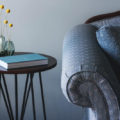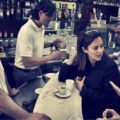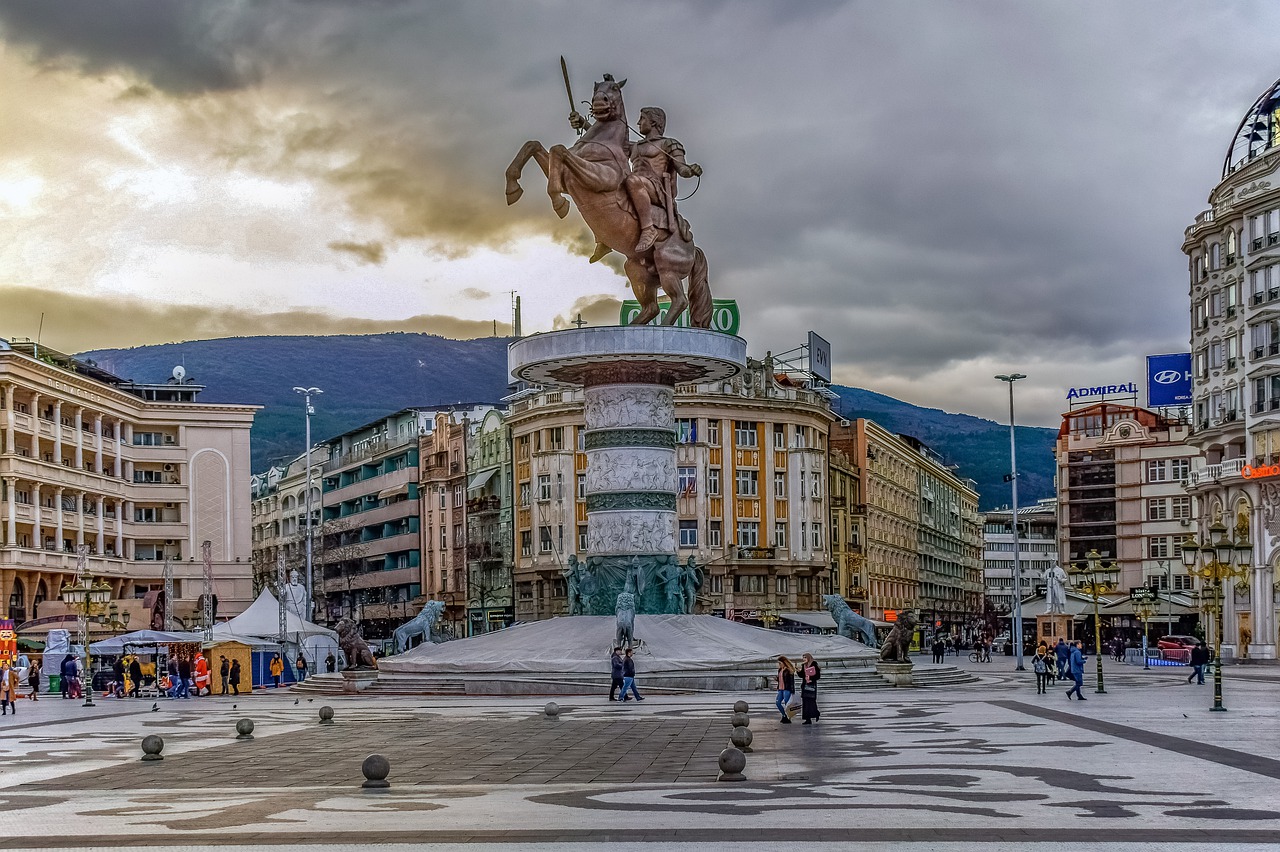
Darina, is a Slovackian friend of Expatclic. She lives in Skopje since 2007 from where she sends us this interesting article about the capital of Macedonia… Thank you Darina!
A brief code of Skopje
I have been in Skopje more than one year and a half now and I thought I would try to share my story of adopting Skopje, of taming it to such an extent that I came to enjoy living here very much. It is for me an interesting and peculiar conclusion because when one starts analyzing things, there are plenty of problems in the capital of Macedonia begging for a solution. Yet I already know that I will always associate having been here with warm feelings. I came to like “capitals of human dimensions”, as one of my French friends called Bratislava, the capital of Slovakia where I come from – small, but very practical for everyday life and still offering the advantages of a capital.
Skopje has been through harsh periods in the past and the effects are still there. The devastating earthquake in 1963 was followed by building a new city in a rush, which then became the capital of a European country. When I first came to Skopje it left in me the impression of a shabby city and I just hoped to find my way through it and to discover places I would like to go to. The hidden jewels came step by step, and the story still goes on, the closer I get, the more I like it. Here is my attempt to reveal some of the secrets of the Macedonian capital, which is of course very subjective, based solely on my personal and still short experience.
Alphabet and language
It is indeed useful to learn at least the Macedonian Cyrillic alphabet as most of the signs in the city are written in Cyrillic. Very helpful when you will try to find out whether you ended in the street you were looking for. Albanian is written in the Latin script.
To learn the Macedonian language is more of a challenge for those with no Slavic background. Yet there is very positive news for those who would like to try. The nouns in Macedonian are not conjugated, there are no declinations. Learning other Slavic languages this would be a barrier that makes it hard to master a language. Throughout the city there are plenty of language courses, and there are lots of qualified Macedonian teachers available.
Also, there are more and more language courses offering Albanian and the numbers of Macedonians learning it are growing. Knowing Albanian is often associated with better job perspectives as it represents one additional advantage.
There are courses in the city offering many foreign languages and the teachers are sometimes IWA (International Women Association ) members using their skills and knowledge of their mother tongue.
What is fascinating is the level of English in Macedonia in general. That is a great help, isn’t it? In general, people, mainly the younger generation, seem to master foreign languages easily and often speak them very well.
Cultural life
Skopje as a small capital offers the advantage of accessibility to different cultural events. Although you will not have a chance to see a big world exhibition here, there are plenty of smaller things going on constantly, and generally you can make up your mind at the last minute and still be able to get a ticket.
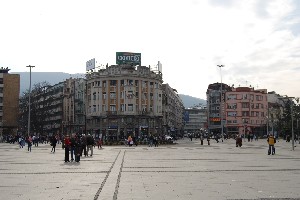
Environment
This is definitely one of the main challenges in Skopje. I will probably always remember a small story from a beautiful residential area which was my first address in Skopje. A well dressed lady living in a family house facing the block of flats where I lived was kicking a cardboard paper out of her courtyard. I naively thought that at one point she would grab it and put it into her garbage bin. No, the idea was simply to push it to the street right in front of her house. Then she turned and went inside.
I have also seen people throwing plastic bags full of garbage out their cars. The masses of garbage in Skopje are a result of this kind of attitude. To me the problem lies mainly in the lack of sensibility and personal responsibility for the environment and a huge awareness campaign would definitely help.
One day I was enjoying one of the meadows at Vodno, the beautiful mountain within the city, a favorite place for Sunday walks by Skopje people. Out of the blue came two young people, probably belonging to an NGO dealing with the environment and virtually cleaned the whole meadow. This approach to the problem just fascinated me because they must have known how the place will look like in a couple of weeks.
Nevertheless, these days first steps are being taken in recycling plastic bottles and paper in two areas of Skopje. If the project, supported by USAID (United States Agency for International Development) proves viable, it should be implemented through the whole of the city.
The beautiful nature in and around Skopje would surely deserve much more than it is getting. Not every capital can boast of the fascinating proximity of awesome nature sceneries as Skopje does.
Health and sports
The notion of health is used very often, usually when saluting somebody on whatever occasion. Even when you buy a piece of clothing, health is mentioned when they wish that you enjoy what you have just bought.
But health in general is perceived more like a gift that you either get or do not get without giving any particular emphasis to your impact on it. Sport is often rather a social occasion than a matter of challenging one’s physical possibilities. Having said that, I have to acknowledge that Skopje probably has a high proportion of regular sports fans, as shown by Vodno and the Vardar riverbank. They never seem to be empty.
Maps, travel guides, books
Look for the recently updated version of the Bradt Travel Guide to Macedonia by Thammy Evans which is the most compact source of information on Skopje and Macedonia in English.
The beautiful natural scenery of Macedonia, and its rich cultural heritage and traditions, have been portrayed in new book in English by Christopher Deliso, Hidden Macedonia: the Mystic Lakes of Ohrid and Prespa. The book, published byHaus Publishing of London, was presented in London in December at the Travel Bookshop, Nothing Hill. You can find out more from www.thetravelbookshop.com.
The selection of maps is not very big and also the locals do not know the names of streets usually, they would rather describe a place with the help of landmarks.
Readiness to help
When going to a place you have no idea about, many of us wondered what it would be like to get into an expected situation in a foreign city. You do not speak the language and do not always know who to call when you get stuck. Many of us can certainly think of situations when you felt at the mercy of people that happen to be around you in that particular moment. The stories that I hear around, and my personal experience, show that in Skopje foreigners get help easily, even from people they have never seen in their lives or know them very little.
I can very gratefully think of many people who helped me out spontaneously, at the right moment, with a big smile and availability that struck me. Nobody has ever made me feel that I bother them with my problems. If you need some information in the street people would be more than willing to explain to you whatever you need or even take their time to take you somewhere.
On one of my first days here I was not able to understand the instructions on how to find a gym opposite Kale, the fortress of Skopje. My street angel understood that it was quicker to take me there than to explain it to me, jumped into his car and I followed him in mine.
Shop assistants, waiters, are rarely in a bad mood. Statistically, in shops, I have the impression that nine out of ten shop assistants would not only explain to me how to find a certain product, but actually bring me there if they see that I am stuck.
Safety
Skopje is rather a safe place for everyday life, but bad things do happen here as everywhere else. Car thefts are rare; the city centre in the evenings is full of people. People go out a lot, mainly on Fridays and Saturdays. Pickpockets do appear here and there, mainly at busy places, but I have not heard frequent complaints. In some residential areas more light at night would help.
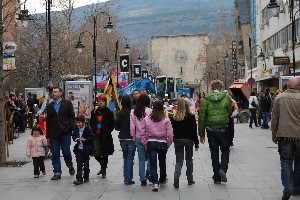
Socialising
Both the Macedonians and Albanians as persons seem to me to be some of the most sociable, warm and spontaneous people that I have ever met.
Macedonians tend to be very talkative and many like to talk about their families as this is the number one value. Uncles and cousins from the mother’s and father’s sides have their respective names that should not be mixed up, and the vocabulary describing different distant family members is exhaustive.
Family ties are very strong; most of the weddings are huge because numerous family relatives and friends simply have to be invited so as not to clash with tradition. Also, the number of parties in Macedonian households is impressive, they simply love to celebrate, any occasion to meet friends or relatives is to be respected and generally very welcome. A lot of families would for example have a day when their house coincides with the name of a saint protecting the family. This saint can be “inherited” from the parents thus circulating in a succession of generations.
Bread, cereals, wine are typical items that would accompany all the important events in the life of a family, be that a birth, a wedding or a funeral.
Family ties are exceptionally strong in Albanian families, feelings of responsibility and solidarity even for very distant family members are very common.
Favourite past times in Skopje seem to me to be just meeting up with friends over a cup of coffee, the most important drink here. This seems to be the most common way to relax in the capital, the coffee houses downtown are always full, probably at any time of day. I guess that psychologists have a hard time to get a decent clientele as most of the grieves and sorrows are relieved by talking to friends. People share their feelings easily, both positive or negative ones, and are very rarely indifferent when expressing their opinion. Normally they would always come up with a strong opinion about something.
Smoking
Smoking is a hard nut to crack as it is a general phenomenon. In general, smokers do not respect any rules (you can see people regularly smoking just in front of non-smoking signs, even at the airport or in restaurants) and are not inclined to ask if somebody around them is bothered by the smoke.
Smoking with small children around the table is an everyday occurrence; you can see people smoking in health care institutions, beauty parlours, small shops, anywhere basically.
There are very few strictly non smoking places. I wish some restaurant owners would have this fantastic marketing idea and open a strictly non-smoking place where one can enjoy its meal without being suffocated for hours to follow.
Traffic
The traffic in Skopje sometimes reminds me more of a jungle than anything else. No imagination is wild enough to describe the numerous possibilities of how to get from one place to another, crossroads being one of the favourite places for very imaginative shortcuts.
Driving backwards in a busy street, driving in the wrong direction, small children on front seats, braking with a margin of a couple of centimeters, are all part of everyday life. One separate chapter are the taxi drivers and motorbike drivers. You can expect them at any time, coming from anywhere, left, right, through a zebra crossing, a pavement.
The traffic is certainly not a place where you can expect courtesy. Even as a very disciplined pedestrian crossing on a zebra crossing, at a green light, you will see things that will make you hair stand up. The general idea about being a pedestrian in Skopje is that you look after your own life and do not think of your theoretical rights.
Fortunately there is one good piece of news. All of this is not usually accompanied by speeding and the police did at least take some initiatives to stop cars turning just anywhere. And last, but not least, from time to time, somebody lets you go with a courtesy and I always appreciate this not very frequent habit. When I let somebody pass, mainly pedestrians, they look at me with gratitude and amazement and always look at my number plate as if they were confirming their inner feeling that I definitely must be a foreigner.
Also peculiar characteristic of Skopje is the way people get into impossible situations when they park their cars, for example, and then often very pragmatically help each other as if solving a complicated puzzle. One day you block me, the other day it is my turn, seems to be the general philosophy. The most frequent explanation is that they only needed a couple of minutes and could not park anywhere else, a twenty meter distance might be too far. It is true that there is a serious lack of planning in the city structure, but a lot of chaos is created simply by people being inconsiderate.
Transparency
There is a social phenomenon in Skopje called vrski (contacts, the right contacts giving you an advantage when compared to somebody else). You will hear this word everywhere when listening to how people get on with their lives, perspectives, futures. People do not really believe they obtain a position simply because they are qualified and skilled. This is an imprint of the tumultuous past, a communist heritage, an uncertain future and also has to do with its small size, shortage of jobs, and the everyday struggle for survival that most people have to face.
Another thing that you will notice immediately is that when you pay for goods and services you don’t always get a receipt.
All in all, when I talk to my foreign friends about living in Skopje everybody comes up with more or less the same issues that are not pleasant in everyday life but somehow we always tend to conclude that the positives always prevail over the negatives and that we enjoy living in the capital of Macedonia.

